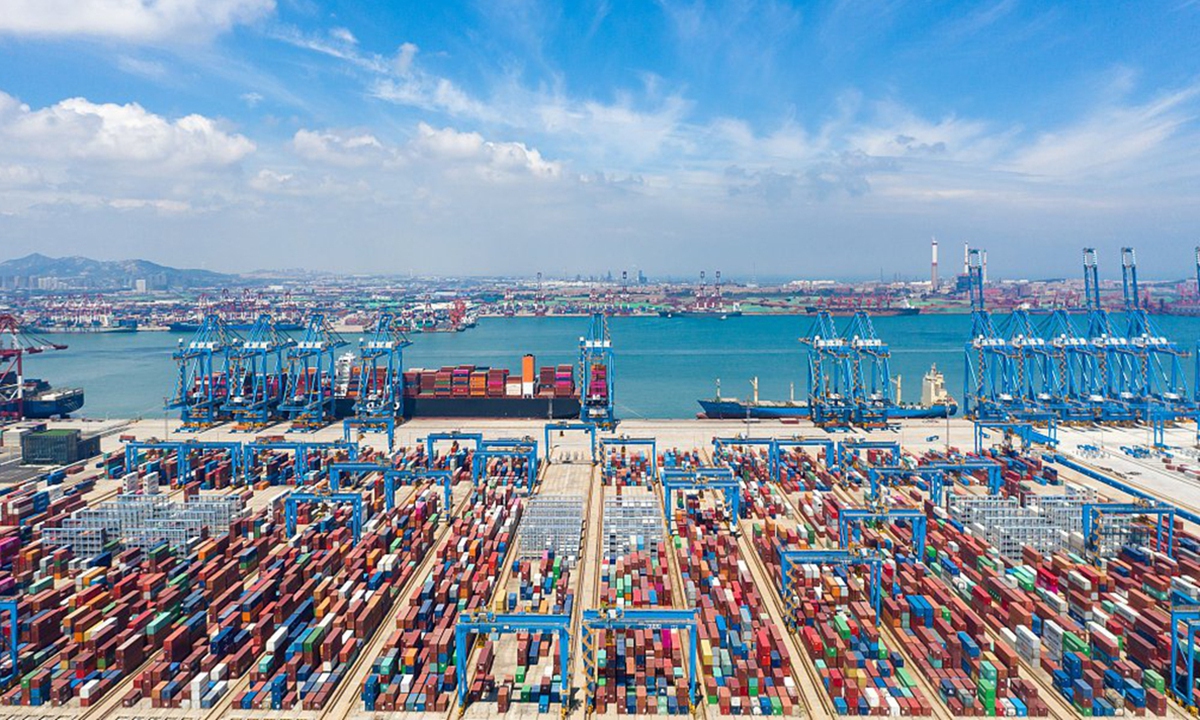
China trade economy File photo: VCG
China's main trade promotion body said on Tuesday that global economic and trade friction continued to worsen in November 2023, with major economies such as the US having introduced more restrictive measures. It vowed to step up trade promotion in 2024, including organizing overseas trips by more than 1,000 business delegations, to help stabilize trade.
Trade experts said that the external environment for China's foreign trade will likely continue to deteriorate in 2024, with declining demand and rising protectionism, but China's advantages and resilience will remain.
At a press conference on Tuesday, the China Council for the Promotion of International Trade (CCPIT) announced its economic and trade friction index for November 2023, which showed a persistent trend of rising friction.
Overall, the index, which tracks 20 countries and regions including China, the US and the EU, rose by 29 points year-on-year to 170. The value of trade affected by friction rose 8 percent year-on-year, though it dropped by 41.8 percent from the previous month.
According to the CCPIT, 29 tariff measures, 21 trade remedy investigations, eight trade restrictions and 156 other restrictive measures were launched by the countries and regions it surveyed, led by Brazil, the US and Mexico. The sub-index for trade friction involving China remained at a high level. Trade friction between Brazil and the US was also severe, the CCPIT said.
Experts said that rising economic and trade friction mainly reflected surging protectionism in many countries and regions, especially the US. Still, China, as the world's biggest trading nation, played and will continue to play a positive role in helping stabilize global trade, they noted.
"China-US trade friction mostly reflected the protectionism of the US ... which adopted an over-extended concept of 'national security' in targeting China," Li Yong, a senior research fellow at the China Association of International Trade, told the Global Times on Tuesday. He noted that as China-US trade cooperation has been hijacked by US politics, the trend of rising friction will likely continue.
Citing many factors, the WTO, in its global trade outlook released in October, cut its estimate of global trade growth in 2023 to 0.8 percent, down from 1.7 percent. Meanwhile, despite headwinds, China's foreign trade grew 0.2 percent in 2023, in what officials and experts called a "hard-won achievement."
Yang Fan, a CCPIT spokesperson, said on Tuesday that external demand remains sluggish, trade protectionism is still on the rise and geopolitical conflicts are worsening, all of which will exert pressure on foreign trade this year.
"But at the same time, what is more important to note is that China's economy is highly resilient, has great potential and is full of vitality. As policy effects gradually emerge and high-level opening-up is steadily promoted, new momentum for trade development will be accelerated, and the fundamentals of foreign trade and foreign investment will continue to be consolidated," Yang told the press conference on Tuesday.
To further stabilize foreign trade, the CCPIT will take various measures, including convening major trade fairs like the 2nd China International Supply Chain Expo, in which more than 100 foreign companies have already expressed interest. The CCPIT will also organize overseas trips for more than 1,000 business delegations to seek new orders and explore more markets, according to Yang.
Li said that it is necessary to upgrade China's trade sector to further reduce costs so as to retain a competitive edge in exports, while major expos will offer opportunities for foreign businesses to expand sales in the Chinese market.
In terms of trade protectionism such as US restrictions on technologies, experts said that protectionist policies will not hold back China's pursuit of indigenous innovation.
"The US restrictions are a mistake and cannot contain China's technological development. The US is shooting itself in the foot and forcing China to innovate," Yao Yang, economist and Boya chair professor at Peking University, told the Global Times on Tuesday, noting that knowledge and technology have been spread all over the world and are no longer monopolized in the US.



